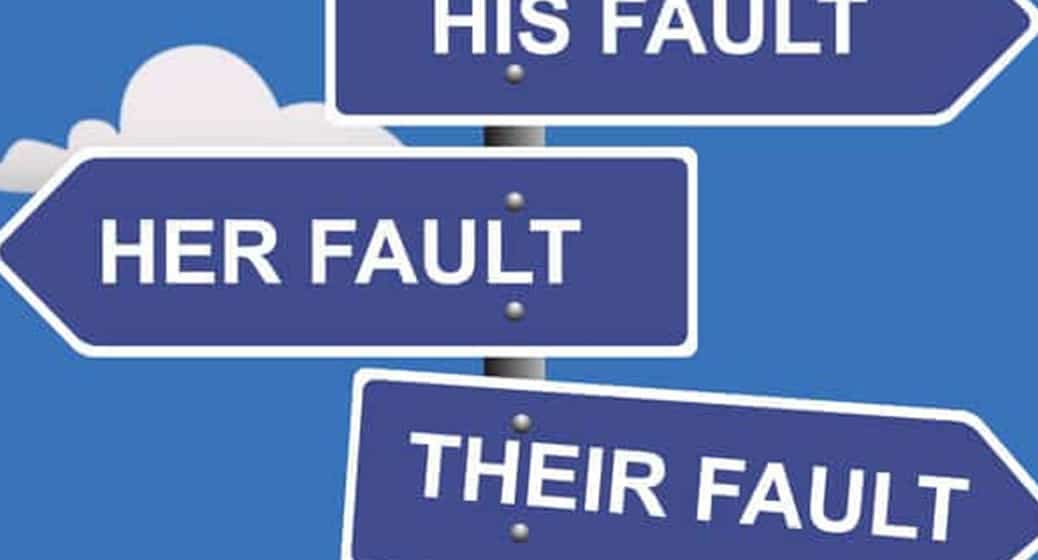Blame Shifting can be summarized as a failure of accountability where an individual (or entity) attempts to force blame on another individual (or entity) who is not responsible for the failure.
Blame Shifting to some is often second nature (sometimes first), intentional or not, malicious or innocent. Blame Shifting can be learned from an unhealthy early family dynamic, or it can be a habit picked up later in life as a way to avoid accountability and unwanted consequences.
Blame Shifting examples include:
- Taking partial responsibility with a “but”
I yelled at you but only because you….
- Adding absolutes in the phrase
If you weren’t always (completely, totally…)
- Scapegoating-strongly and unfairly repeatedly blaming the same person for every mistake-past, present, and future. Often unrelated mistakes will be brought up into the current situation.
If a couple has a baby who is awake all night because of teething and a parent makes a mistake at work, or they are late to functions…all blame goes to the baby and their baby’s teething troubles (and future phase of life events as the child ages).
Blame Shifting is a “choose the victim game.” The one being blamed is suddenly the victim of another’s rath or a situation they hold very little, if any, responsibility in. The one shifting is now the “victim” of the world because “woe is me” that I have this situation- which I am innocent, but yet a part of- in my lap. “Woe is the stress of my life!”
We, as professionals, often see those who are victims of blame shifting cross our couch and there are many techniques to help these clients navigate the “it’s not me; it’s you mentality”, such as setting boundaries, gray rocking, assertive communication skills, limiting contact with stressors and the lists go on.
The real question lies in, how can we help the client who shifts blame and struggles with accountability without leaving them feeling discarded and alone? First, work hard to get to the bottom of the reason for the shifting.
- Family dynamic, was it a “hurt them before they hurt you” or “keep the front door looking good” household?
- Is the client oozing anxiety and they don’t know how to cope with responsibility?
- Is fear the basis of the blame shifting? Fear of losing what status one has and fear of not getting one’s way?
Often, “you are blame shifting” is not received well by the client. Tread lightly and ask the client questions about their family or caregiver of origin, such as: How did the client accept punishment as a child and what was the punishment? What were they punished for as a child? Listen for other areas of life where anxiety or fear has been existent throughout or currently in their life. The blame shifting, while unhealthy, is a symptom of a deeper issue.
How to Help
Teaching healthy coping mechanisms is needed for a space between when a client recognizes, or it is brought to their attention, that they did something wrong and that immediate response to blame someone/thing else. The client needs that space to ground themselves and not react as they used to in order to figure out an appropriate response. Role playing can be helpful after a person is grounded and in a safe space with a therapist as a guide to help them share openly something they have made a mistake on-start small. The client will see that the world will not end just because they made a mistake.
Next, help a client weigh out the catastrophe they see in their head if they do begin to accept responsibility. Over time, the client will realize their world does not fall apart if they accept responsibility and their self-compassion will build. Help the client see times in the past where others have shifted blame to them and examine their feelings in that instance.
And finally, take your own accountability daily. Everyone is human and has blame shifting behavior come out at some points. What were you feeling, avoiding, losing control over? How have you learned to accept accountability, practice self-compassion, and apologize when needed? This is a great way to practice the tools we teach others and gain insight and empathy into our client’s battles.
For help with any of the above, I would love to hear from you at jess54301@gmail.com or visit www.worthcounseling.com
Blessings,
Jessica
Keep Reading
Want more? Here are some other blog posts you might be interested in.








